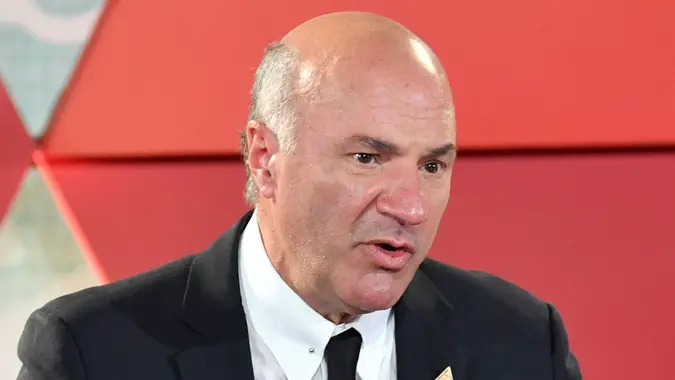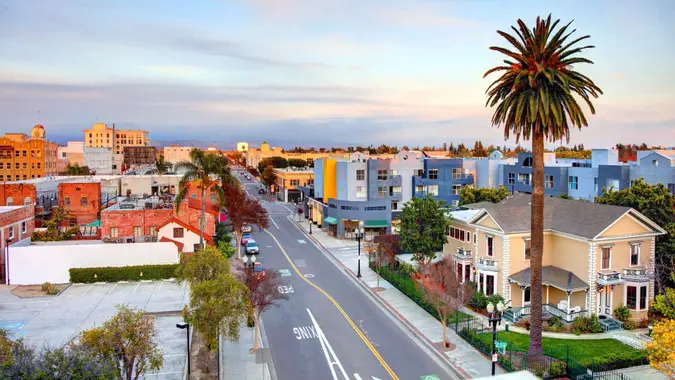4 Reasons a Trump Second Term Could Be a Financial Disaster for Boomers

Commitment to Our Readers
GOBankingRates' editorial team is committed to bringing you unbiased reviews and information. We use data-driven methodologies to evaluate financial products and services - our reviews and ratings are not influenced by advertisers. You can read more about our editorial guidelines and our products and services review methodology.

20 Years
Helping You Live Richer

Reviewed
by Experts

Trusted by
Millions of Readers
Many Americans had a positive economic experience during Donald Trump’s presidency. An April poll from the Associated Press-NORC Center for Public Affairs revealed Americans believed Trump was better for the economy and that he had helped with job creation and the cost of living in the country.
While this group includes boomers (those born between 1946 and 1964), the data indicates a second Trump term could actually be financially problematic for senior citizens.
Underachieved Promises
The Trump Administration didn’t fully accomplish things as he promised. This includes ineffective tax cuts that favored corporations and the wealthy, plus tariffs and trade deals that failed to recover all of the lost factory jobs, per the Associated Press.
While Trump stated the tax cuts would grow at 3%, he further “inflated” expectations, saying the growth could hit between 4% and 6%. Ultimately, the average growth after inflation was 2.67%. In contrast, annual growth under President Biden currently averages 3.4%.
Trump attributes lower inflation to his administration when the evidence points to the pandemic as the cause — lower gas prices and mortgage rates resulted from a lack of driving and real estate purchases. While 6.7 million jobs were added during Trump’s term, Biden added 15.4 million (more than twice as many). If we look at just manufacturing jobs, Trump brought 461,000 while Biden added 773,000. Based on these numbers, Trump offered less job recovery, overestimations and underachieved deficit reduction — none of which benefits boomers.
No Help for Retired People?
Trump has expressed a focus on greater tariffs, mass deportation of unauthorized immigrants and more corporate tax cuts. Trump and his campaign leaders have said he won’t cut Social Security and Medicare, but they also have talked about the “waste” around those programs. It remains to be seen what he might do to help the solvency of Social Security.
“Lower-income households and seniors could find themselves facing challenges if shifts toward deregulation lead to reductions in social support programs or changes to Medicare and Social Security, as has been debated,” said David L. Blain, CFA, founder and CEO of BlueSky Wealth Advisors. “Such demographic groups typically rely more on these types of governmental support structures, which could be altered or scaled back.”
As Colin Ruggiero, co-founder of DisabilityGuidance.org, told GOBankingRates, “Doing nothing could also be damaging to the program as a whole.”
Impact of Tax and Tariff Plans
Going back to the polls, Americans “overwhelmingly” believe Trump will be better for their finances and the economy, according to CNN. But the evidence reportedly points to higher taxes for the “bottom 80% of Americans” as a result of Trump’s plans for tax and tariff plans, which doesn’t bode well for younger boomers who are struggling with savings.
Trump’s tariffs during his presidency reportedly resulted in $80 billion in added taxes on Americans. He plans to double down on tariffs if he wins this year, which means Americans could pay even more. The U.S.-China Business Council projects that the U.S. economy would contract by $1.6 trillion over five years if Trump presses tariffs.
Inflation
Trump reportedly is interested in controlling the Federal Reserve, but the reduced political autonomy of the Fed historically has resulted in higher inflation rates.
According to Harvard economist Jason Furman, “If Trump undermined [the Fed’s] independence and their credibility — which he has proven he is quite likely to try to do — that could make it very difficult to keep inflation under control.”
Devaluing the dollar and reducing the labor force by cutting immigration also could contribute to higher inflation.
Andrew Lisa and John Csiszar contributed to the reporting for this article.
 Written by
Written by  Edited by
Edited by 

























